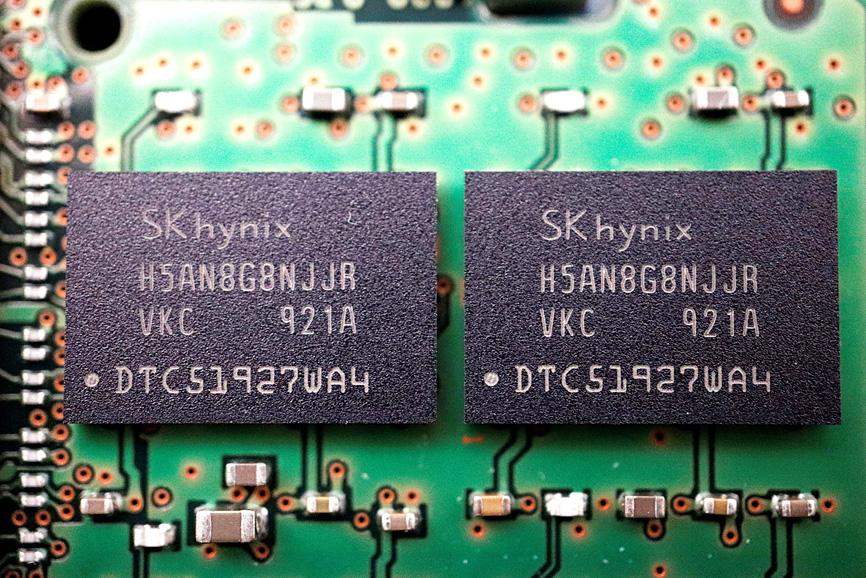World chip sales growth has decelerated for six straight months in another sign that the global economy is straining under the weight of rising interest rates and mounting geopolitical risks.
Semiconductor sales rose 13.3 percent in June from a year earlier, down from 18 percent in May, data from the global peak industry body showed. The slowdown is the longest since the US-China trade dispute in 2018.
The three-month moving average in chip sales has correlated with the global economy’s performance in the past few decades. The latest weakness comes as concern about a worldwide recession has prompted chipmakers such as Samsung Electronics Co to consider winding back investment plans.

Photo: Reuters
Semiconductors are key components in a world that is increasingly reliant on digital products and services, particularly during the COVID-19 pandemic, when a lot of work and schooling was conducted remotely.
Chip sales started to cool as central banks began scrambling to raise interest rates to combat spiraling inflation, and Russia’s war in Ukraine and prolonged COVID-19 lockdowns in China prompted a rapid reversal in the international outlook.
A Bloomberg Economics global tracker showed the prospects for the world economy have deteriorated rapidly this year, coinciding with chip sales beginning to slow.
Signs of an international downturn are also observed in trade data from South Korea, the world’s biggest producer of memory chips. Growth in chip exports last month eased to 2.1 percent from 10.7 percent in June, the fourth straight monthly decline.
In June, semiconductor stockpiles rose by the most in more than six years.
It is a similar story in Taiwan, which is another key player in electronics supply chains. The latest data indicated that manufacturing in the nation contracted in June and last month, while production and demand slumped, with new export orders registering the biggest fall.
The weakening momentum in these two canaries in the global coal mine is partly due to a slowing economy in China, which continues to impose lockdowns under its “zero COVID-19” policy. China’s factory activity unexpectedly contracted last month and property sales continue to shrink.
In the US, GDP has fallen for two straight quarters, although Cambridge, Massachusetts-based think tank the National Bureau of Economic Research refuses to call it a recession.
In Europe, factory activity plunged in June, further darkening the outlook for the continent and the wider world.
Nonetheless, the IMF still sees a global expansion this year, and slowing chip sales do not automatically indicate a recession is imminent.
However, they offer a glimpse into the health of an international economy that relies heavily on the tiny components to manufacture everything from vehicles to smartphones to computers.
The peak world body — the Washington-based Semiconductor Industry Association — says it represents 99 percent of the US chip industry by revenue and almost two-thirds of non-US chip firms.
The sales it releases are compiled by World Semiconductor Trade Statistics.

RECYCLE: Taiwan would aid manufacturers in refining rare earths from discarded appliances, which would fit the nation’s circular economy goals, minister Kung said Taiwan would work with the US and Japan on a proposed cooperation initiative in response to Beijing’s newly announced rare earth export curbs, Minister of Economic Affairs Kung Ming-hsin (龔明鑫) said yesterday. China last week announced new restrictions requiring companies to obtain export licenses if their products contain more than 0.1 percent of Chinese-origin rare earths by value. US Secretary of the Treasury Scott Bessent on Wednesday responded by saying that Beijing was “unreliable” in its rare earths exports, adding that the US would “neither be commanded, nor controlled” by China, several media outlets reported. Japanese Minister of Finance Katsunobu Kato yesterday also

Jensen Huang (黃仁勳), founder and CEO of US-based artificial intelligence chip designer Nvidia Corp and Taiwan Semiconductor Manufacturing Co (TSMC, 台積電) on Friday celebrated the first Nvidia Blackwell wafer produced on US soil. Huang visited TSMC’s advanced wafer fab in the US state of Arizona and joined the Taiwanese chipmaker’s executives to witness the efforts to “build the infrastructure that powers the world’s AI factories, right here in America,” Nvidia said in a statement. At the event, Huang joined Y.L. Wang (王英郎), vice president of operations at TSMC, in signing their names on the Blackwell wafer to

‘DRAMATIC AND POSITIVE’: AI growth would be better than it previously forecast and would stay robust even if the Chinese market became inaccessible for customers, it said Taiwan Semiconductor Manufacturing Co (TSMC, 台積電) yesterday raised its full-year revenue growth outlook after posting record profit for last quarter, despite growing market concern about an artificial intelligence (AI) bubble. The company said it expects revenue to expand about 35 percent year-on-year, driven mainly by faster-than-expected demand for leading-edge chips for AI applications. The world’s biggest contract chipmaker in July projected that revenue this year would expand about 30 percent in US dollar terms. The company also slightly hiked its capital expenditure for this year to US$40 billion to US$42 billion, compared with US$38 billion to US$42 billion it set previously. “AI demand actually

RARE EARTHS: The call between the US Treasury Secretary and his Chinese counterpart came as Washington sought to rally G7 partners in response to China’s export controls China and the US on Saturday agreed to conduct another round of trade negotiations in the coming week, as the world’s two biggest economies seek to avoid another damaging tit-for-tat tariff battle. Beijing last week announced sweeping controls on the critical rare earths industry, prompting US President Donald Trump to threaten 100 percent tariffs on imports from China in retaliation. Trump had also threatened to cancel his expected meeting with Chinese President Xi Jinping (習近平) in South Korea later this month on the sidelines of the APEC summit. In the latest indication of efforts to resolve their dispute, Chinese state media reported that